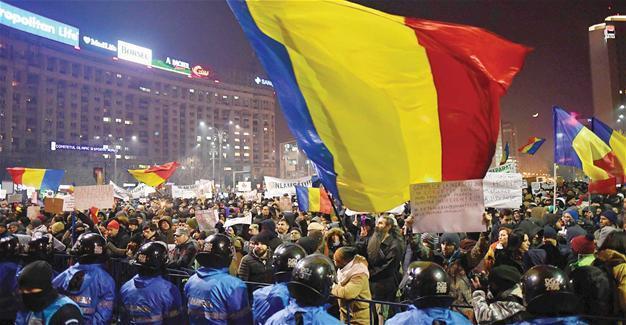Romanians rally in biggest anti-corruption protest in decades
BUCHAREST

More than 250,000 Romanians demonstrated on Feb. 1 against a government decree decriminalizing some graft offences, seen as the biggest retreat on reforms since the country joined the European Union in 2007.
Romania’s top judicial watchdog, the Superior Magistrates’ Council (CSM), earlier in the day filed a constitutional court challenge to the decree unveiled by the new Social Democrat government of Prime Minister Sorin Grindeanu.
Romanian President Klaus Iohannis also said he would ask the Constitutional Court to declare unconstitutional a government decree that dilutes what qualifies as corruption amid major protests against the measure.
The number of protesters rose to a new high in the evening, reaching 130,000 to 150,000 outside the cabinet building in Bucharest.
Another 100,000 to 150,000 were estimated by riot police to have joined similar rallies in 55 other towns and cities.
The rally in the capital subsided peacefully by 10:00 p.m. GMT, but after people left the square, a group of about 300 soccer ultras came in and threw fireworks and stones at riot police. The police dispersed them with tear gas. Two policemen and two protesters were slightly hurt by stones, the emergency service said.
The decree that triggered the nationwide protests was approved by the cabinet on the evening of Jan. 31.
“Repeal it, then leave,” protesters shouted. “Thieves, thieves.” Many waved Romanian national flags.
“Our chances are small but it is important to fight,” said Gabriela Constantin, a 36-year-old architect.
If enforced, as planned, within 10 days, the decree would, among other things, decriminalize abuse-of-power offences in which the sums involved are less than 200,000 lei ($48,000).
That would put an end to the current trial of Social Democrat party leader Liviu Dragnea, accused of using his political influence to secure state salaries for two people working at his party headquarters between 2006 and 2013.
Dozens of other political figures from all parties stand to benefit from the decree.
“I don’t understand what the protesters are upset about,” Dragnea told reporters on Jan. 31.
A Romanian cabinet minister resigned on Feb. 2 over the government decree.
Florin Jianu, Romania’s minister of business, trade and entrepreneurship, announced on Facebook that he was resigning. It is the “ethical to do,” he said, “not for my professional honesty, my conscience is clean on that front, but for my child.”
“How am I going to look him in the eye and what am I going to tell him over the years?” he wrote. “Am I going to tell him his father was a coward and supported actions he does not believe in, or that he chose to walk away from a story that isn’t his?”
 More than 250,000 Romanians demonstrated on Feb. 1 against a government decree decriminalizing some graft offences, seen as the biggest retreat on reforms since the country joined the European Union in 2007.
More than 250,000 Romanians demonstrated on Feb. 1 against a government decree decriminalizing some graft offences, seen as the biggest retreat on reforms since the country joined the European Union in 2007.